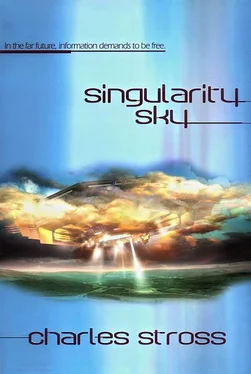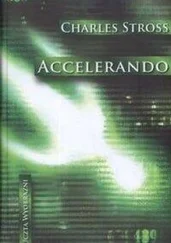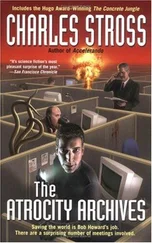Charles Stross - Singularity Sky
Здесь есть возможность читать онлайн «Charles Stross - Singularity Sky» весь текст электронной книги совершенно бесплатно (целиком полную версию без сокращений). В некоторых случаях можно слушать аудио, скачать через торрент в формате fb2 и присутствует краткое содержание. ISBN: , Жанр: Фантастика и фэнтези, на английском языке. Описание произведения, (предисловие) а так же отзывы посетителей доступны на портале библиотеки ЛибКат.
- Название:Singularity Sky
- Автор:
- Жанр:
- Год:неизвестен
- ISBN:9788495024121
- Рейтинг книги:5 / 5. Голосов: 1
-
Избранное:Добавить в избранное
- Отзывы:
-
Ваша оценка:
- 100
- 1
- 2
- 3
- 4
- 5
Singularity Sky: краткое содержание, описание и аннотация
Предлагаем к чтению аннотацию, описание, краткое содержание или предисловие (зависит от того, что написал сам автор книги «Singularity Sky»). Если вы не нашли необходимую информацию о книге — напишите в комментариях, мы постараемся отыскать её.
Singularity Sky
Singularity Sky — читать онлайн бесплатно полную книгу (весь текст) целиком
Ниже представлен текст книги, разбитый по страницам. Система сохранения места последней прочитанной страницы, позволяет с удобством читать онлайн бесплатно книгу «Singularity Sky», без необходимости каждый раз заново искать на чём Вы остановились. Поставьте закладку, и сможете в любой момент перейти на страницу, на которой закончили чтение.
Интервал:
Закладка:
Charles Stross
SINGULARITY SKY
Prologue
The day war was declared, a rain of telephones fell clattering to the cobblestones from the skies above Novy Petrograd. Some of them had half melted in the heat of reentry; others pinged and ticked, cooling rapidly in the postdawn chill. An inquisitive pigeon hopped close, head cocked to one side; it pecked at the shiny case of one such device, then fluttered away in alarm when it beeped. A tinny voice spoke:
“Hello? Will you entertain us?”
The Festival had come to Rochard’s World.
A skinny street urchin was one of the first victims of the assault on the economic integrity of the New Republic’s youngest colony world. Rudi — nobody knew his patronymic, or indeed his father — spotted one of the phones lying in the gutter of a filthy alleyway as he went about his daily work, a malodorous sack wrapped around his skinny shoulders like a soldier’s bedroll. The telephone lay on the chipped stones, gleaming like polished gunmetal: he glanced around furtively before picking it up, in case the gentleman who must have dropped it was still nearby. When it chirped he nearly dropped it out of fear: a machine ! Machines were upper-class and forbidden, guarded by the grim faces and gray uniforms of authority. Nevertheless, if he brought it home to Uncle Schmuel, there might be good eating: better than he could buy with the proceeds of the day’s sackful of dog turds for the tannery. He turned it over in his hands, wondering how to shut it up, and a tinny voice spoke: “Hello? Will you entertain us?” Rudi nearly dropped the phone and ran, but curiosity held him back for a moment: “Why?”
“Entertain us and we will give you anything you want.”
Rudi’s eyes widened. The metal wafer gleamed with promise between his cupped hands. He remembered the fairy stories his eldest sister used to tell before the coughing sickness took her, tales of magic lamps and magicians and djinn that he was sure Father Borozovski would condemn as infidel nonsense; and his need for escape from the dull brutality of everyday life did battle with his natural pessimism — the pessimism of barely more than a decade of backbreaking labor. Realism won. What he said was not, I want a magic flying carpet and a purse full of gold roubles or I want to be Prince Mikhail in his royal palace , but, “Can you feed my family?”
“Yes. Entertain us, and we will feed your family.”
Rudi racked his brains, having no idea how to go about this exotic task; then he blinked. It was obvious!
He held the phone to his mouth, and whispered, “Do you want me to tell you a story?” By the end of that day, when the manna had begun to fall from orbit and men’s dreams were coming to life like strange vines blooming after rain in the desert, Rudi and his family— sick mother, drunken uncle, and seven siblings — were no longer part of the political economy of the New Republic.
War had been declared.
Deep in the outer reaches of the star system, the Festival’s constructor fleet created structure out of dead mass. The Festival fleet traveled light, packed down into migratory starwisps that disdained the scurrying FTL of merely human clades. When it arrived, fusion pods burned bright as insectile A-life spawned furiously in the frigid depths of the outer system. Once the habitats were complete and moved into orbit around the destination planet, the Festival travelers would emerge from aestivation, ready to trade and listen.
Rochard’s World was a backwater colony of the New Republic, itself not exactly the most forward-looking of post-Diaspora human civilizations. With a limited industrial base to attract trade — limited by statute, as well as by ability — few eyes scanned the heavens for the telltale signatures of visiting ships. Only the spaceport, balanced in ground-synchronous orbit, kept a watch, and that was focused on the inner-system ecliptic. The Festival fleet had dismantled a gas giant moon and three comets, begun work on a second moon, and was preparing to rain telephones from orbit before the Imperial Traffic Control Bureau noticed that anything was amiss.
Moreover, there was considerable confusion at first. The New Republic was, if not part of the core worlds, not far out of it; whereas the Festival’s origin lay far outside the light cone of the New Republic’s origin, more than a thousand light-years from old anarchist Earth. Although they shared a common ancestry, the New Republic and the Festival had diverged for so many centuries that everything — from their communications protocols to their political economies, by way of their genome — was different. So it was that the Festival orbiters noticed (and ignored) the slow, monochromatic witterings of Imperial Traffic Control. More inexplicably, it did not occur to anybody in the Ducal palace to actually pick up one of the half-melted telephones littering their countryside, and ask, “Who are you and what do you want?” But perhaps this was not so surprising; because by midafternoon Novy Petrograd was in a state of barely controlled civil insurrection.
Burya Rubenstein, the radical journalist, democratic agitator, and sometime political prisoner (living in internal exile on the outskirts of the city, forbidden to return to the father planet — to say nothing of his mistress and sons — for at least another decade) prodded at the silvery artifact on his desk with a finger stained black from the leaky barrel of his pen. “You say these have been falling everywhere?” he stated, ominously quietly.
Marcus Wolff nodded. “All over town. Misha wired me from the back country to say it’s happening there, too. The Duke’s men are out in force with brooms and sacks, picking them up, but there are too many for them. Other things, too.“
“Other things.” It wasn’t phrased as a question, but Burya’s raised eyebrow made his meaning clear.
“Things falling from the skies — and not the usual rain of frogs!” Oleg Timoshevski bounced up and down excitedly, nearly upsetting one of the typecases that sat on the kitchen table beside him, part of the unlicensed printing press that Rubenstein has established on peril of another decade’s internal exile. “The things — like a telephone, I think, at least they talk back when you ask them something — all say the same thing; entertain us, educate us, we will give you anything you want in return! And they do! I saw a bicycle fall from the skies with my own eyes! And all because Georgi Pavlovich said he wanted one, and told the machine the story of Roland while he waited.”
“I find this hard to believe. Perhaps we should put it to the test?” Burya grinned wolfishly, in a way that reminded Marcus of the old days, when Burya had a fire in his belly, a revolver in his hand, and the ear of ten thousand workers of the Rail-yard Engineering Union during the abortive October Uprising twelve years earlier. “Certainly if our mysterious benefactors are happy to trade bicycles for old stories, I wonder what they might be willing to exchange for a general theory of postindustrial political economy?”
“Better dine with the devil with a long, long spoon,” warned Marcus.
“Oh, never fear; all I want to do is ask some questions.” Rubenstein picked up the telephone and turned it over in his hands, curiously. “Where’s the — ah. Here. Machine. Can you hear me?”
“Yes.” The voice was faint, oddly accentless, and slightly musical.
“Good. Who are you, where are you from, and what do you want?”
“We are Festival.” The three dissidents leaned closer, almost bumping heads over the telephone. “We have traveled many two-hundred-and-fifty-sixes of light-years, visiting many sixteens of inhabited planets.
Читать дальшеИнтервал:
Закладка:
Похожие книги на «Singularity Sky»
Представляем Вашему вниманию похожие книги на «Singularity Sky» списком для выбора. Мы отобрали схожую по названию и смыслу литературу в надежде предоставить читателям больше вариантов отыскать новые, интересные, ещё непрочитанные произведения.
Обсуждение, отзывы о книге «Singularity Sky» и просто собственные мнения читателей. Оставьте ваши комментарии, напишите, что Вы думаете о произведении, его смысле или главных героях. Укажите что конкретно понравилось, а что нет, и почему Вы так считаете.












